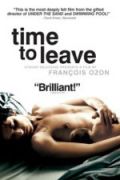
France 2005
Directed by
Francois Ozon
85 minutes
Rated MA
Reviewed by
Bernard Hemingway

Time To Leave
It is a testament to François Ozon’s skills as a film-maker that this sometimes fey and ultimately silly story was not only taken seriously in its day but received with a good deal of critical enthusiasm.
Melvil Poupaud plays Romain, a petulant, gay high fashion photographer who is considerably alienated from the world around him including his boyfriend (Christian Sengewald), parents and adult sister. This unhappy condition is compounded when he is diagnosed with an aggressive cancer that leaves him with very little time to live (the film’s title playing with this idea). He withdraws even further into himself telling no-one about his fate except his beloved grandmother (Jeanne Moreau). On his way to visit the latter he meets Jany (Valeria Bruni-Tedeschi) who presents him with a very unusual proposal.
The script has potential that in places is realized, in particular in the performance by Melvil as the stoically devastated young man but Ozon who also wrote the screenplay tends to be a tad indulgent with his handsome hero’s wistfulness lingering overlong on Romain’s lost childhood as he gazes soulfully on young boys like Dirk Bogarde in an updating of Visconti’s Death in Venice (1971) albeit without the fin-de-siècle style. At times this tendency unfortunately achieves the bathetic as when Romain asks his wizened grandmother if he can sleep with her (he means really sleep). Moreau replies “ I sleep in the nude you know” and Romain replies “I promise not to look” That would be an easy promise to keep particularly as Moreau looks like a fright thanks to some very poor cosmetic work.
Matters really go pear-shaped however when out-of-the-blue he is asked to be a sperm donor for Jany because her husband is sterile. Whilst we can accept this as the kind of plot contrivance necessary to keep a fictional diegesis moving the idea that either party would enter into such a transaction with so little knowledge of each other is awkwardly implausible. The extent of Jany’s enquiries to Romain is to ask him when she first makes the offer if he has AIDS. He says no and that's good enough for her although she, unlike us, doesn’t know that the hypothetical father of her future child given to habitually cruising hard-core gay bars. Later, after the transaction has been completed, which you'd have to say is a bit late in the day she asks him if his terminal disease is hereditary. He relies “No, its cancer” which just goes to show how little medical knowledge Ozon has.
Whilst we can assume that Roman decides to sire a child with Jany because of a sense of disappointment about he way his own life has turned out that he would do so with operator of roadside café hardly convinces whilst in the age of in vitro fertilization the need for the deed to be done old school style with the husband warming up Jany is somewhat ridiculous and the fact that Jany becomes immediately pregnant on the strength of a single encounter has to be noted as remarkably fortunate.
Ozon’s primary point of reference in this film seems to be the work of Max Ophuls and Douglas Sirk, often referred to as “women’s pictures” and much loved by gay audiences. Such will probably find this much more convincing than I, for whom the dissonance between sentiment and reality is too great to bear.
Want something different?





